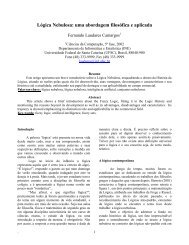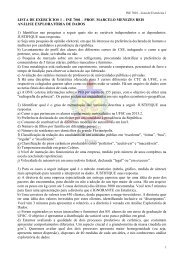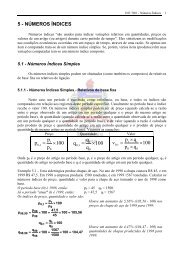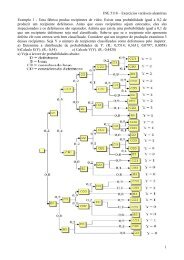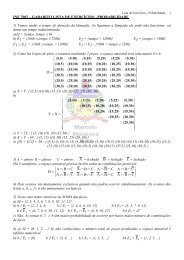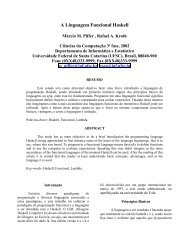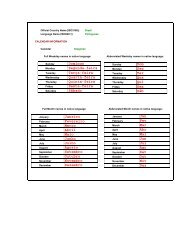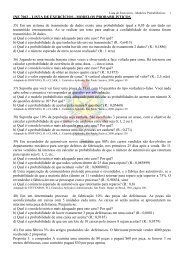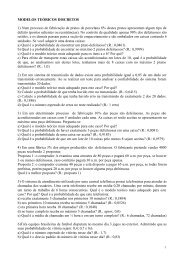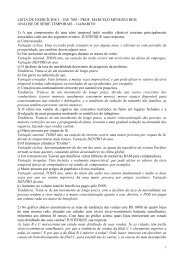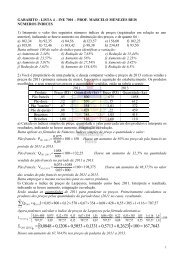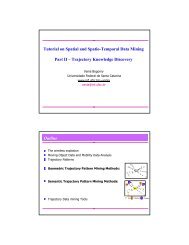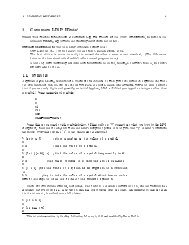- Page 1 and 2:
De 15 a 17 de outubro de 2001 Flori
- Page 3 and 4:
Sumário Apresentação............
- Page 5 and 6:
Análise Ergonômica do Estado da A
- Page 7 and 8:
de formidável coesão, denominado
- Page 9 and 10:
Sociedade Brasileira de Computaçã
- Page 11:
Fund. Educacional de Criciúma - FU
- Page 15 and 16:
Palestras Internacionais Online Com
- Page 17:
Objetivos: O objetivo deste mini-cu
- Page 21 and 22:
Anais do IHC’2001 - IV Workshop s
- Page 23 and 24:
Anais do IHC’2001 - IV Workshop s
- Page 25 and 26:
Anais do IHC’2001 - IV Workshop s
- Page 27 and 28:
Anais do IHC’2001 - IV Workshop s
- Page 29 and 30: Anais do IHC’2001 - IV Workshop s
- Page 31 and 32: Anais do IHC’2001 - IV Workshop s
- Page 33 and 34: Anais do IHC’2001 - IV Workshop s
- Page 35 and 36: Anais do IHC’2001 - IV Workshop s
- Page 37 and 38: Anais do IHC’2001 - IV Workshop s
- Page 39 and 40: Anais do IHC’2001 - IV Workshop s
- Page 41 and 42: Anais do IHC’2001 - IV Workshop s
- Page 43 and 44: Anais do IHC’2001 - IV Workshop s
- Page 45 and 46: Anais do IHC’2001 - IV Workshop s
- Page 47 and 48: Anais do IHC’2001 - IV Workshop s
- Page 49 and 50: Anais do IHC’2001 - IV Workshop s
- Page 51 and 52: Anais do IHC’2001 - IV Workshop s
- Page 53 and 54: Anais do IHC’2001 - IV Workshop s
- Page 55 and 56: Anais do IHC’2001 - IV Workshop s
- Page 57 and 58: Anais do IHC’2001 - IV Workshop s
- Page 59 and 60: Anais do IHC’2001 - IV Workshop s
- Page 61 and 62: Anais do IHC’2001 - IV Workshop s
- Page 63 and 64: Anais do IHC’2001 - IV Workshop s
- Page 65 and 66: Anais do IHC’2001 - IV Workshop s
- Page 67 and 68: Anais do IHC’2001 - IV Workshop s
- Page 69 and 70: Anais do IHC’2001 - IV Workshop s
- Page 71 and 72: Anais do IHC’2001 - IV Workshop s
- Page 73 and 74: Anais do IHC’2001 - IV Workshop s
- Page 75 and 76: Anais do IHC’2001 - IV Workshop s
- Page 77 and 78: Anais do IHC’2001 - IV Workshop s
- Page 79: Anais do IHC’2001 - IV Workshop s
- Page 83 and 84: Anais do IHC’2001 - IV Workshop s
- Page 85 and 86: Anais do IHC’2001 - IV Workshop s
- Page 87 and 88: Anais do IHC’2001 - IV Workshop s
- Page 89 and 90: Anais do IHC’2001 - IV Workshop s
- Page 91 and 92: Anais do IHC’2001 - IV Workshop s
- Page 93 and 94: Anais do IHC’2001 - IV Workshop s
- Page 95 and 96: Anais do IHC’2001 - IV Workshop s
- Page 97 and 98: Anais do IHC’2001 - IV Workshop s
- Page 99 and 100: Anais do IHC’2001 - IV Workshop s
- Page 101 and 102: Anais do IHC’2001 - IV Workshop s
- Page 103 and 104: Anais do IHC’2001 - IV Workshop s
- Page 105 and 106: Anais do IHC’2001 - IV Workshop s
- Page 107 and 108: Anais do IHC’2001 - IV Workshop s
- Page 109 and 110: Anais do IHC’2001 - IV Workshop s
- Page 111 and 112: Anais do IHC’2001 - IV Workshop s
- Page 113 and 114: Anais do IHC’2001 - IV Workshop s
- Page 115 and 116: Anais do IHC’2001 - IV Workshop s
- Page 117 and 118: Anais do IHC’2001 - IV Workshop s
- Page 119 and 120: Anais do IHC’2001 - IV Workshop s
- Page 121 and 122: Anais do IHC’2001 - IV Workshop s
- Page 123 and 124: Anais do IHC’2001 - IV Workshop s
- Page 125 and 126: Anais do IHC’2001 - IV Workshop s
- Page 127 and 128: Anais do IHC’2001 - IV Workshop s
- Page 129 and 130: Anais do IHC’2001 - IV Workshop s
- Page 131 and 132:
Anais do IHC’2001 - IV Workshop s
- Page 133 and 134:
Anais do IHC’2001 - IV Workshop s
- Page 135 and 136:
Anais do IHC’2001 - IV Workshop s
- Page 137 and 138:
Anais do IHC’2001 - IV Workshop s
- Page 139 and 140:
Anais do IHC’2001 - IV Workshop s
- Page 141 and 142:
Anais do IHC’2001 - IV Workshop s
- Page 143 and 144:
Anais do IHC’2001 - IV Workshop s
- Page 145 and 146:
Anais do IHC’2001 - IV Workshop s
- Page 147 and 148:
Anais do IHC’2001 - IV Workshop s
- Page 149 and 150:
Anais do IHC’2001 - IV Workshop s
- Page 151 and 152:
Anais do IHC’2001 - IV Workshop s
- Page 153 and 154:
Anais do IHC’2001 - IV Workshop s
- Page 155 and 156:
Anais do IHC’2001 - IV Workshop s
- Page 157 and 158:
Anais do IHC’2001 - IV Workshop s
- Page 159 and 160:
Anais do IHC’2001 - IV Workshop s
- Page 161 and 162:
Anais do IHC’2001 - IV Workshop s
- Page 163 and 164:
Anais do IHC’2001 - IV Workshop s
- Page 165 and 166:
Anais do IHC’2001 - IV Workshop s
- Page 167 and 168:
Anais do IHC’2001 - IV Workshop s
- Page 169 and 170:
Anais do IHC’2001 - IV Workshop s
- Page 171 and 172:
Anais do IHC’2001 - IV Workshop s
- Page 173 and 174:
Anais do IHC’2001 - IV Workshop s
- Page 175 and 176:
Anais do IHC’2001 - IV Workshop s
- Page 177 and 178:
Anais do IHC’2001 - IV Workshop s
- Page 179 and 180:
Anais do IHC’2001 - IV Workshop s
- Page 181 and 182:
Anais do IHC’2001 - IV Workshop s
- Page 183 and 184:
Anais do IHC’2001 - IV Workshop s
- Page 185 and 186:
Anais do IHC’2001 - IV Workshop s
- Page 187 and 188:
Anais do IHC’2001 - IV Workshop s
- Page 189 and 190:
Anais do IHC’2001 - IV Workshop s
- Page 191 and 192:
Anais do IHC’2001 - IV Workshop s
- Page 193 and 194:
Anais do IHC’2001 - IV Workshop s
- Page 195 and 196:
Anais do IHC’2001 - IV Workshop s
- Page 197 and 198:
Anais do IHC’2001 - IV Workshop s
- Page 199 and 200:
Anais do IHC’2001 - IV Workshop s
- Page 201 and 202:
Anais do IHC’2001 - IV Workshop s
- Page 203 and 204:
Anais do IHC’2001 - IV Workshop s
- Page 205 and 206:
Anais do IHC’2001 - IV Workshop s
- Page 207 and 208:
Anais do IHC’2001 - IV Workshop s
- Page 209 and 210:
Anais do IHC’2001 - IV Workshop s
- Page 211 and 212:
Anais do IHC’2001 - IV Workshop s
- Page 213 and 214:
Anais do IHC’2001 - IV Workshop s
- Page 215 and 216:
Anais do IHC’2001 - IV Workshop s
- Page 217 and 218:
Anais do IHC’2001 - IV Workshop s
- Page 219 and 220:
Anais do IHC’2001 - IV Workshop s
- Page 221 and 222:
Anais do IHC’2001 - IV Workshop s
- Page 223 and 224:
Anais do IHC’2001 - IV Workshop s
- Page 225 and 226:
Anais do IHC’2001 - IV Workshop s
- Page 227 and 228:
Anais do IHC’2001 - IV Workshop s
- Page 229 and 230:
Anais do IHC’2001 - IV Workshop s
- Page 231 and 232:
Anais do IHC’2001 - IV Workshop s
- Page 233 and 234:
Anais do IHC’2001 - IV Workshop s
- Page 235 and 236:
Anais do IHC’2001 - IV Workshop s
- Page 237 and 238:
Anais do IHC’2001 - IV Workshop s
- Page 239 and 240:
Anais do IHC’2001 - IV Workshop s
- Page 241 and 242:
Anais do IHC’2001 - IV Workshop s
- Page 243 and 244:
Anais do IHC’2001 - IV Workshop s
- Page 245 and 246:
Anais do IHC’2001 - IV Workshop s
- Page 247 and 248:
Anais do IHC’2001 - IV Workshop s
- Page 249 and 250:
Anais do IHC’2001 - IV Workshop s
- Page 251 and 252:
Anais do IHC’2001 - IV Workshop s
- Page 253 and 254:
Anais do IHC’2001 - IV Workshop s
- Page 255 and 256:
Anais do IHC’2001 - IV Workshop s
- Page 257 and 258:
Anais do IHC’2001 - IV Workshop s
- Page 259 and 260:
Anais do IHC’2001 - IV Workshop s
- Page 261 and 262:
Anais do IHC’2001 - IV Workshop s
- Page 263 and 264:
Anais do IHC’2001 - IV Workshop s
- Page 265 and 266:
Anais do IHC’2001 - IV Workshop s
- Page 267 and 268:
Anais do IHC’2001 - IV Workshop s
- Page 269 and 270:
Anais do IHC’2001 - IV Workshop s
- Page 271 and 272:
Anais do IHC’2001 - IV Workshop s
- Page 273 and 274:
Anais do IHC’2001 - IV Workshop s
- Page 275 and 276:
Anais do IHC’2001 - IV Workshop s
- Page 277 and 278:
Anais do IHC’2001 - IV Workshop s
- Page 279 and 280:
Anais do IHC’2001 - IV Workshop s
- Page 281 and 282:
Anais do IHC’2001 - IV Workshop s
- Page 283 and 284:
Anais do IHC’2001 - IV Workshop s
- Page 285 and 286:
Anais do IHC’2001 - IV Workshop s
- Page 287 and 288:
Anais do IHC’2001 - IV Workshop s
- Page 289:
IV Workshop sobre Fatores Humanos e
- Page 292 and 293:
272 Anais do IHC’2001 - IV Worksh
- Page 294 and 295:
274 4. Considerações Finais Anais
- Page 296 and 297:
276 Anais do IHC’2001 - IV Worksh
- Page 298 and 299:
278 Anais do IHC’2001 - IV Worksh
- Page 300 and 301:
280 Anais do IHC’2001 - IV Worksh
- Page 302 and 303:
282 Anais do IHC’2001 - IV Worksh
- Page 304 and 305:
284 Anais do IHC’2001 - IV Worksh
- Page 306 and 307:
286 Anais do IHC’2001 - IV Worksh
- Page 308 and 309:
288 Anais do IHC’2001 - IV Worksh
- Page 310 and 311:
290 Anais do IHC’2001 - IV Worksh
- Page 312 and 313:
292 Anais do IHC’2001 - IV Worksh
- Page 314 and 315:
294 Anais do IHC’2001 - IV Worksh
- Page 316 and 317:
296 Anais do IHC’2001 - IV Worksh
- Page 318 and 319:
298 Anais do IHC’2001 - IV Worksh
- Page 320 and 321:
300 Anais do IHC’2001 - IV Worksh
- Page 322 and 323:
302 Anais do IHC’2001 - IV Worksh
- Page 324 and 325:
304 Anais do IHC’2001 - IV Worksh
- Page 326 and 327:
306 Anais do IHC’2001 - IV Worksh
- Page 328 and 329:
308 Anais do IHC’2001 - IV Worksh
- Page 330 and 331:
310 Anais do IHC’2001 - IV Worksh
- Page 332 and 333:
312 Anais do IHC’2001 - IV Worksh
- Page 334 and 335:
314 Artigos Anais do IHC’2001 - I



